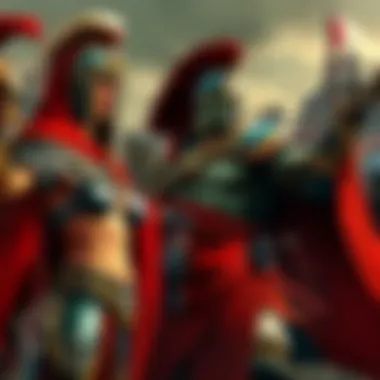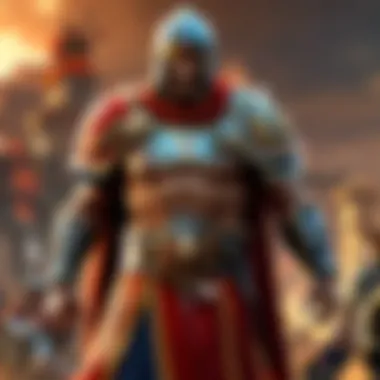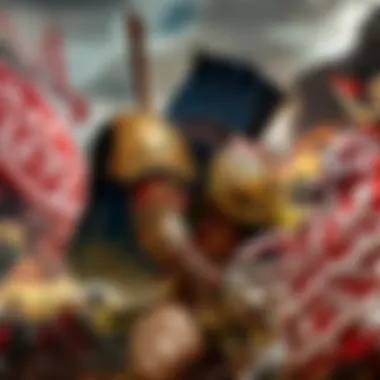In-Depth Exploration of Games Similar to Rome Total War: An Analytical Study


Hero Guides
In the realm of strategic video games reminiscent of Rome Total War, understanding the basics of each hero is paramount to mastering gameplay dynamics. Skill build and leveling structures serve as crucial elements determining success on the battlefield, guiding players towards optimal performance. Itemization choices and recommended items heavily influence strategy execution, directly impacting in-game outcomes. Navigating through nuanced strategies and tips tailored to individual heroes is essential for honing skills and gaining a competitive edge.
Game Updates & Patch Notes
Staying abreast of the latest developments in game updates and patch notes is integral to staying ahead in the dynamic gaming landscape. Summarizing recent patch notes sheds light on changes to heroes, items, and gameplay mechanics, offering insights into the evolving meta and its impact on the competitive scene. Adapting to these alterations requires a deep understanding of the nuances driving gameplay refinement and strategic adaptation.
Competitive Strategies
Unpacking the intricacies of popular strategies in the current meta unveils the complexity of team compositions and synergies that shape competitive gameplay. Delving into counter picks and situational strategies provides a strategic advantage essential for outmaneuvering opponents and securing victories. Analyzing evolving gameplay trends offers valuable lessons for maximizing team performance and strategic execution.
Community Events & Tournaments
Exploring upcoming tournaments and community events provides a glimpse into the vibrant landscape of competitive gaming. Understanding event schedules and prize pools illuminates opportunities for players to engage, compete, and excel in the esports arena. Immersing in player interviews and insights offers a unique perspective into the minds of top competitors, enriching one's understanding of the competitive gaming ecosystem.
New Releases & Game Reviews
Engaging with reviews of newly released heroes, updates, or patches offers a window into the evolving game dynamics and mechanics. Conducting an in-depth analysis of fresh features and mechanics allows for valuable comparisons with previous iterations, enhancing community feedback and shaping future gameplay enhancements. Keeping abreast of critical reviews and community sentiments is crucial for staying informed and making informed decisions in the ever-evolving gaming landscape.
Introduction to Strategic Video Games
In this resilient journey through the realm of strategic video games similar to Rome Total War, we embark on a meticulous exploration that unveils the intricacies and strategic prowess demanded by these immersive virtual battlegrounds. Strategic Video Games serve as intellectual battlegrounds where players engage in intricate battles of wit, resource management, and tactical acumen. The art of strategic video games lies in its ability to captivate the mind, offering a dynamic blend of historical context, tactical challenges, and decision-making scenarios that truly test the player's strategic acuity. In this article, we delve into the profound world of strategic video games akin to Rome Total War, dissecting their gameplay mechanics, historical richness, and critical reception to provide readers with a comprehensive guide into the strategic gaming landscape.
Evolution of Strategy Games
The Birth of Strategy Games
Misteg smaller ****************** The inception of strategy games marks a pivotal moment in the evolution of the gaming industry, where players were introduced to a realm of gameplay that transcended mere entertainment, delving into realms of intellect and strategic thinking. Games like Civilization and Command & Conquer emerged as pioneers, laying the foundation for the strategic gaming genre. The Birth of Strategy Games brought forth a new era where gamers were not just participants but strategic architects shaping virtual worlds with their decisions. This essence continues to shape the strategic gaming landscape, fostering a community of players who relish complex challenges and strategic intricacies indicative of The Birth of Strategy Games.
Technological Advancements Impacting Gameplay
As we traverse the realm of strategy games, the influence of technological advancements on gameplay cannot be understated. **************** Technological advancements have revolutionized the gaming experience, offering players unprecedented immersion, realism, and complexity in gameplay mechanics. From enhanced graphics rendering to intricate AI algorithms, the Technological Advancements Impacting Gameplay have elevated strategic gaming to new heights. The fusion of cutting-edge technology and strategic gameplay not only enhances the player experience but also sets new standards for immersion and challenge in the strategic gaming landscape.
Role of Strategy in Gaming
Strategic Thinking and Decision Making
Deciphering quir ****************** Strategic Thinking and Decision Making lie at the core of gaming philosophies, providing players with a platform to hone their strategic acumen and decision-making capabilities. The crux of strategic gaming resides in the player's ability to anticipate, strategize, and adapt to ever-evolving scenarios, making each move with precision and foresight. Embarking on strategic endeavors demands more than rapid reflexes; it necessitates profound analysis, long-term planning, and intellectual dexterity, encapsulating the essence of this stimulating genre. Strategic Thinking and Decision Making act as pillars that uphold the strategic gaming landscape, challenging players to navigate complex scenarios with strategic finesse.
The Art of War in Virtual Realms


In the ethereal realm of virtual worlds, The Art of War transcends mere battles; it embodies a saga of conquest, diplomacy, and calculated maneuvers that shape the course of virtual empires. The Art of War in Virtual Realms encapsulates the essence of strategic gaming, offering players a canvas to paint their conquests with tactical brilliance and strategic foresight. From intricate diplomatic negotiations to pulse-pounding battlefield strategies, players immerse themselves in a realm where every decision carries weight, and every move shapes destinies. Enter the virtual battlefield, where The Art of War reigns supreme, defining the very essence of strategic mastery in the gaming sphere.
Overview of Rome Total War
In analyzing the critical aspects of Rome Total War, it is essential to delve into its significance within the realm of strategic video games. Rome Total War stands as a pillar of the genre, known for its intricate gameplay mechanics, historical depth, and critical reception. The game's appeal lies in its blend of turn-based strategy elements and real-time battles, offering players a unique and immersive gaming experience. Understanding the gameplay mechanics and historical context of Rome Total War provides valuable insights into the evolution of strategy games and the art of war in virtual realms.
Gameplay Mechanics
Turn-Based Strategy Elements
The turn-based strategy elements in Rome Total War play a pivotal role in setting the game apart from its counterparts. Players have the opportunity to strategize and plan their moves meticulously, fostering strategic thinking and decision-making skills. The key characteristic of turn-based gameplay is the allowance for thorough deliberation before executing actions, adding a layer of complexity and depth to the gaming experience. While turn-based strategy may not be everyone's cup of tea, its methodical approach resonates well with players seeking a more cerebral challenge.
Real-Time Battles and Tactics
On the other hand, real-time battles and tactics bring a sense of urgency and dynamism to Rome Total War. Engaging in battles in real-time requires quick thinking, adaptability, and precise execution of strategies. The key characteristic of real-time gameplay is the adrenaline rush it provides, immersing players in the heart of the action on the battlefield. However, this mode of gameplay may not suit players who prefer a slower, more contemplative pace. Understanding the nuances and balancing act between turn-based strategy and real-time battles is key to mastering Rome Total War.
Historical Context
Ancient Rome Setting
The Ancient Rome setting in Rome Total War serves as the backdrop for epic campaigns of conquest and diplomacy. The portrayal of Ancient Rome is vivid and detailed, capturing the essence of the era's political intrigue and military might. The key characteristic of the Ancient Rome setting is its historical authenticity, allowing players to immerse themselves in a rich and vibrant world filled with ancient wonders. While this setting provides a gripping narrative and thematic depth, some players may find its historical constraints limiting in terms of gameplay flexibility.
Empire Building and Conquest
Empire building and conquest mechanics add a layer of grandeur and ambition to Rome Total War. Players are tasked with expanding their empires, managing resources, and engaging in diplomatic relations with other factions. The key characteristic of empire building is the scale of operations and the dynamic nature of conflicts and alliances. This gameplay aspect offers a sense of progression and achievement but also demands careful planning and strategic foresight. Balancing expansion with stability is crucial in navigating the treacherous waters of empire building in Rome Total War.
In the realm of strategic video games, delving into titles akin to Rome Total War offers a rich tapestry of gameplay, historical context, and critical reception. By exploring various games within this genre, readers are guided through unique features and mechanics that characterize these immersive gaming experiences.
Similar Games to Rome Total War
Diving into games similar to Rome Total War is crucial for understanding the strategic gaming landscape. Each title brings distinct elements and benefits to the table, contributing to the evolution of the genre. By analyzing similar games, players gain insights into the strategic diversity, nuanced mechanics, and thematic depth that shape these immersive experiences.
Medieval II: Total War
- Feudal Europe Setting
Feudal Europe Setting
The Feudal Europe setting in Medieval II: Total War offers a backdrop of political intrigue and territorial conquest. Its portrayal of medieval power dynamics provides a rich playground for strategic decision-making. The feudal system's intricacies shape gameplay, offering a blend of feudalism, warfare, and diplomacy. Players navigate vassal relationships, noble alliances, and dynastic ambitions, adding layers of complexity to the strategic narrative.
- Campaigns and Diplomacy
Campaigns and Diplomacy


Campaigns and diplomacy are pivotal aspects of Medieval II: Total War, elevating the gameplay experience. Engaging in political negotiations, forging alliances, or waging diplomatic wars significantly impact the player's strategic choices. The deep-rooted diplomatic mechanics influence campaign success, offering a realistic portrayal of medieval power struggles. While diplomacy can secure lasting alliances, it also poses risks, presenting players with nuanced challenges in their quest for dominance.
Crusader Kings
- Dynastic Politics and Intrigue
Dynastic Politics and Intrigue
Dynastic politics and intrigue define the core of Crusader Kings III, elevating the strategic depth of the gameplay. Navigating familial relationships, succession conflicts, and court dynamics adds a layer of complexity to decision-making. Players must juggle political alliances, manage vassals, and safeguard their dynasty's legacy, creating a dynamic and immersive gaming experience.
- Realm Management and Expansion
Realm Management and Expansion
In Crusader Kings III, realm management and expansion present strategic opportunities and challenges. Governing a realm involves balancing internal stability with external conquests, requiring players to cultivate strong governance while expanding their territories. The intricate interplay between managing resources, vassals, and territories shapes the player's strategic decisions, influencing the growth and longevity of their realm.
Empire: Total War
- 18th Century Global Warfare
18th Century Global Warfare
The setting of 18th Century global warfare in Empire: Total War offers a unique strategic landscape. Players engage in large-scale battles across continents, navigating the complexities of global power dynamics. From colonial expansion to revolutionary conflicts, the era presents diverse strategic challenges, blending military strategy with diplomatic finesse. Exploring the nuances of 18th Century warfare adds depth and realism to the gameplay experience.
- Naval Combat and Trade Empires
Naval Combat and Trade Empires
Naval combat and trade empires feature prominently in Empire: Total War, shaping players' strategic decisions. Commanding naval fleets, establishing trade routes, and engaging in maritime warfare are essential aspects of empire building. The strategic interplay between naval dominance and economic prosperity defines players' quest for global supremacy, offering a multifaceted and challenging gameplay experience.
Total War: Three Kingdoms
- Ancient China Setting
Ancient China Setting
The Ancient China setting in Total War: Three Kingdoms brings to life the rich tapestry of ancient Chinese history. Players immerse themselves in the intricacies of Chinese dynasties, military commanders, and wartime alliances. The setting's cultural depth and historical significance provide a unique backdrop for strategic gameplay, highlighting the blend of warfare, philosophy, and diplomacy in ancient China.
- Hero-centric Gameplay
Hero-centric Gameplay


Hero-centric gameplay in Total War: Three Kingdoms introduces a dynamic element to strategic decision-making. Players command legendary heroes, each with unique abilities and traits, reshaping the battlefield dynamics. Leveraging hero strengths, executing tactical maneuvers, and forging strategic alliances define the player's journey towards unifying China. The hero-focused gameplay offers a fresh perspective on strategic warfare, adding layers of depth and narrative richness to the gaming experience.
Critical Analysis and Reception
When it comes to understanding the essence of [Critical Analysis and Reception] within the scope of this article, its significance cannot be overstated. [Critical Analysis and Reception] serves as the key to unlocking a deeper comprehension of the games akin to Rome Total War. It provides a lens through which one can dissect the nuances of gameplay mechanics, historical accuracies, and overall player engagement. By critically analyzing these aspects, players and enthusiasts alike can garner a profound appreciation for the strategic elements embedded in these games. Reception, on the other hand, offers insights into how these games are perceived by the gaming community and critics. Understanding the reception sheds light on the strengths and weaknesses of each game, aiding both developers and players in shaping the future of strategic gaming.
Gameplay Depth and Complexity
Strategic Layers and Tactical Challenges
Delving into the realm of [Strategic Layers and Tactical Challenges], one uncovers the intricate web of decision-making that forms the backbone of strategic gaming. These layers add depth and complexity to the gameplay, requiring players to think several steps ahead to outmaneuver opponents. The strategic acumen needed to navigate these challenges is unparalleled, making it a cornerstone of the genre's appeal. The interplay between strategic planning and tactical execution defines the experience, providing a dynamic and engaging environment for players to immerse themselves in. While these challenges can be daunting, they offer a rewarding sense of accomplishment when overcome, cementing them as essential components of strategic gaming.
AI Behavior and Diplomatic Options
Another pivotal aspect of strategic gaming is [AI Behavior and Diplomatic Options], which shape the player's interaction with the virtual world. The AI's intelligence and decision-making processes simulate real-world scenarios, challenging players to adapt and strategize accordingly. By incorporating diplomatic options, games introduce a layer of complexity that mimics historical and political dynamics, enhancing the overall gameplay experience. However, these features come with their own set of advantages and disadvantages. While they add depth and realism to the game, they also require players to invest time in understanding and mastering these mechanics, catering to a more dedicated segment of the gaming audience.
Community Feedback and Impact
Modding Community Contributions
Within the strategic gaming community, [Modding Community Contributions] play a vital role in shaping the longevity and diversity of gameplay experiences. The community's creativity and innovation result in custom content that extends the game's lifespan far beyond its original release. These contributions introduce new elements, mechanics, and storylines, fostering a sense of inclusivity and community engagement among players. While the advantages of modding are evident in the enhanced replay value and personalized experiences they offer, there are also challenges such as compatibility issues and quality control that developers and players must navigate.
E-sports and Competitive Scene
The rise of [E-sports and Competitive Scene] in strategic gaming amplifies the competitive aspect of these virtual worlds, transforming them into platforms for skilled players to showcase their talents. The organized competitions and tournaments elevate strategic gaming to a professional level, captivating audiences and inspiring a new generation of cyber-athletes. This competitive landscape not only fosters camaraderie and sportsmanship but also drives innovation and pushes the boundaries of strategic gameplay. Nevertheless, the competitive scene comes with its own set of advantages and disadvantages – while it promotes skill development and community cohesion, it can also be intense and demanding, requiring players to balance passion with discipline and perseverance.
Future of Strategic Gaming
Embarking on this exploration of games akin to Rome Total War, it is prudent to cast our gaze towards the horizon that beckons the future of strategic gaming. The landscape of gaming is undergoing a metamorphosis, driven by technological advancements and evolving player expectations. In the realm of strategic gaming, the future holds promises of heightened immersion, intricate gameplay mechanics, and unprecedented levels of player engagement. Understanding the nuances and intricacies of the future of strategic gaming is vital in grasping the trajectory of this niche within the gaming industry.
Technological Advancements and Immersion
Virtual Reality Integration
Diving deeper into the realm of strategic gaming, the integration of virtual reality emerges as a pivotal point of discussion. Virtual reality offers a paradigm shift in gaming immersion, allowing players to step into the shoes of their in-game counterparts with unparalleled realism. The key characteristic of virtual reality integration lies in its ability to transport players to immersive virtual worlds, blurring the lines between the physical and digital realms. This transformative technology enriches the gaming experience by offering a heightened sense of presence and interaction, revolutionizing how players engage with strategic gameplay. While virtual reality integration introduces a new dimension of immersion, it also poses challenges such as compatibility issues and cost constraints, influencing its adoption in the context of strategic gaming.
Artificial Intelligence Enhancements
Delving further into the tapestry of strategic gaming, artificial intelligence enhancements emerge as a cornerstone of future innovations. Enhancing AI algorithms within games elevates the strategic depth and tactical challenges faced by players, creating more dynamic and realistic gameplay experiences. The key characteristic of AI enhancements is their capacity to simulate human-like decision-making, providing players with formidable opponents and allies alike. This aspect is crucial for enhancing the strategic complexity of games akin to Rome Total War, shaping the dynamics of battles and diplomatic interactions within virtual realms. However, the integration of advanced AI systems also raises concerns regarding ethical considerations and the need for balanced gameplay experiences in the evolving landscape of strategic gaming.
Emerging Trends and Innovations
Cross-platform Gameplay
As we navigate through the landscape of strategic gaming, the concept of cross-platform gameplay emerges as a harbinger of connectivity and accessibility. Cross-platform gameplay breaks down barriers between different gaming ecosystems, enabling players to engage seamlessly across various devices and platforms. The key characteristic of cross-platform gameplay lies in its ability to foster a unified gaming community, where players can compete and collaborate regardless of their preferred gaming device. This trend not only promotes inclusivity and diversity within strategic gaming communities but also enhances the overall ecosystem by fostering a vibrant player base with varied experiences and playstyles. Despite its advantages in promoting interoperability, cross-platform gameplay may encounter challenges related to balancing gameplay mechanics and performance optimization across diverse platforms.
Procedural Generation in Strategy Games
At the forefront of strategic gaming innovation stands procedural generation, a dynamic approach reshaping gameplay experiences. Procedural generation introduces randomness and algorithmic design principles to create diverse and evolving game worlds, offering endless possibilities for exploration and strategic decision-making. The key characteristic of procedural generation in strategy games lies in its ability to generate unique game scenarios and environments with each playthrough, enhancing replay value and player engagement. This innovative feature not only adds depth to gameplay experiences but also challenges players to adapt to ever-changing virtual landscapes, fueling strategic thinking and adaptation. While procedural generation fosters a sense of unpredictability and discovery in strategic games akin to Rome Total War, it also necessitates careful balance to maintain coherence and player agency within procedurally generated settings.



